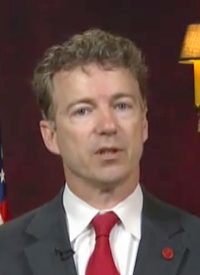
"In 2007, then-candidate Obama said that 'The President does not have power under the Constitution to unilaterally authorize a military attack in a situation that does not involve stopping an actual or imminent threat to the nation,'" Paul recalled. "I agree with candidate Obama. Unfortunately, President Obama has failed to heed his own advice. He has ignored our Constitution and engaged us in a military conflict without congressional debate and approval."
While Obama said in his address from the National Defense University that he consulted with congressional leaders on a bipartisan basis before intervening, Paul said: "The Constitution doesn't say the President can wage war after he talks to a handful of Congressional leaders. The Constitution says Congress — all of Congress — is responsible for declaring war." And while the U.S. President characterized Gadhafi's military assault on Libyan civilians as an affront to America's "interests and values," Paul remained unconvinced.
"What imminent threat did Gadhafi or Libya pose to the United States?" the freshman Senator asked. "Obviously, the decision to take military action of this magnitude is something that should not be taken lightly, and should first require determining whether it is in the United States' vital national interest. Over the weekend, even Defense Secretary Robert Gates admitted that America has no vital interest in Libya."
While praising America's "brave men and women in uniform," Paul said "they should not be asked to be nation-builders or the world's policemen. And they should serve in wars authorized and called for by the United States Congress, not the United Nations."
Noting that there are uprisings now taking place throughout the Middle East, Paul warned of the perils of intervening where there is no clear threat to the United States. "The problem with sending U.S. military to help rebels in Libya or anywhere else is that we are taking sides in a conflict and on behalf of a people whom we know nothing about," he said. "When, or if, there is regime change in Libya, what kind of leadership, exactly, will replace Gadhafi? Who are the Libyan rebels exactly? The Daily Telegraph newspaper in London reported over the weekend that some Libyan rebel leaders now claim they have members of al-Qaida within their ranks and are glad to have them. Why do we have American soldiers, our best and bravest, helping people in Libya who may be the very same people we ask our military to fight in Afghanistan and Iraq?"
Stressing the importance of the constitutional issues involved, Paul said our nation's Founders "understood the seriousness of war and thus included in our Constitution a provision stating that only Congress can declare war. The decision to wage war should not be undertaken cavalierly." Paul quoted James Madison, often referred to as the "Father of the Constitution" for his role at the Constitutional Convention.
"The Constitution supposes what the history of all Governments demonstrates, that the executive is the branch of power most interested in war and most prone to it," Madison wrote. "It has accordingly with studied care vested the question of war in the Legislature."
Had Obama consulted the whole of Congress, "as our Constitution requires him to do," said Paul, "perhaps we could have debated these questions before hastily involving ourselves in yet another Middle Eastern conflict."
Paul noted that the United States is "already in two wars that we are not paying for. We are waging war across the Middle East on a credit card, one whose limit is rapidly approaching. And this is just wrong. We already borrow money from countries like China to pay for our wars in Afghanistan and Iraq and it would be interesting to know how many Americans believe we should continue borrowing money and saddling future generations with debt to pay for our current actions in Libya." And, he insisted, we cannot be sure of whether our actions in the skies above Libya or helping or hurting our own cause.
"What if we are sending our military to places where we might actually be helping the same terrorists we fight in other countries or potential future terrorists?" Paul asked.
"It's time that we re-examine these policies by once again consulting the Constitution on such matters and the common-sense principles that made this country great. We can no longer afford to spend what we don't have. And we can't afford to address every other nation's problems before we can address our own."
Photo: Sen. Rand Paul
Related articles:
UN, Obama Fighting Alongside Al-Qaeda in Libya
Paul, Kucinich Seek to Defund "Impeachable" War on Libya
Obama, Clinton, and Biden Agree: War on Libya Is Unconstitutional
UN Trumps Constitution, Congress in President's Undeclared War on Libya
A Real Cost/Benefit Analysis of Libyan Intervention
On Libya, It's the Beltway Interventionists vs. Ron Paul and the Founders



